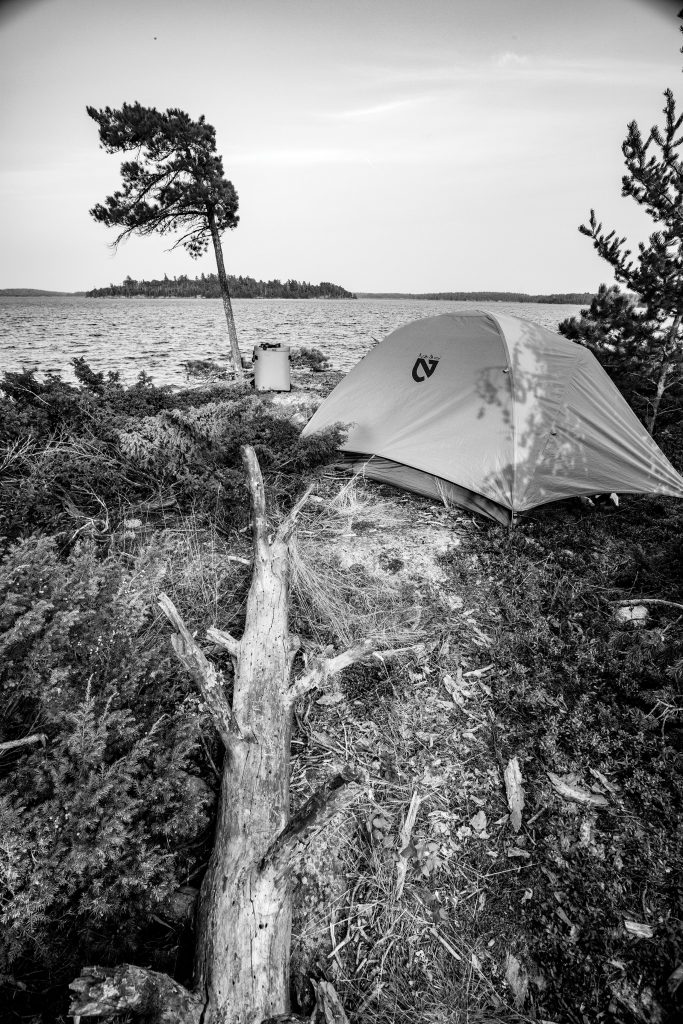Simple Places by Jeffrey Hancock

My head screamed in pain at camp.
It had been a long and demanding previous three days as I wrapped up work, prepared to leave, made the trip, and connected with my wife and kids for a 3-night adventure in the Boundary Waters Canoe Area Wilderness (BWCAW). I had left from Kansas the day before after spending the previous night packing for a new adventure, of which I had no experience with. The plan was to meet in Minneapolis, catch them on an incoming flight after a two week visit in Vermont with grandma, shovel down some dinner, dash to a hotel bed and awake early the next morning for the five or so hour drive to Moose Lake. The plan worked out great, but I underestimated the mental toll of changing all those gears along the way.
At Moose Lake we geared up, settled up on rented canoes and permits, and struck off across the water to arrive at our first camping spot of the evening. We had finally made it…Wilderness. It was about seven o’clock when we landed camp and I was spent with pain in the brain. About forty-eight hours earlier I had been at a desk doing what engineering business owners do and in a mental state far different than I expect of myself in the woods.
The camping spot was beautiful. A stone’s throw away from Canada, loons yodeling, near zero wind, and cool temps compared to the Kansas August I had come from. We ate a quick dinner of freeze dry near dark and enjoyed an evening paddle. The kids were giddy with excitement, as I was too. Nevertheless, something was wrong. I still had a million things operating through my head from the days behind me; and the shift from the quiet of my temporary two-week bachelor life to instant family was conflicting me. I could tell it was going to be a wicked night of man versus overtime brain and trying to shift on little rest.
I struggled all night and awoke the next morning to a real pounder, nausea and dry heaves. I mostly watched as the rest of the family packed everything up and then we canoed to a new spot for the next evening’s camp. We paddled; my head hurt. We portaged; my head hurt. We ate lunch; my head hurt. We set up camp; my head hurt. In desperation I finally entered the water with nothing but the clothes I was born with, hoping the shock of cold would reset things. That helped a little. Man, that water was cold.
We had made the trip to the BWCAW after hearing of an impending mining permit that could potentially change the area forever; and I wanted to get my kids in there so they would understand why this area is so special. I had also never been myself, but I had heard and listened enough that like many of our Wilderness Areas, it was special for a good reason. I would rather my kids appreciate unscathed wild lands than what a copper-nickel mine is or its impacts. One of the principal characteristics of appreciation is that it does not require understanding; and appreciation is far more effective in generating movement than understanding.
My kids do know what wilderness is. They know what it is like to look up and see endless bright stars that stretch from horizon to horizon mixed with the foggy band of the Milky Way. They know what a loon sounds like, how fast an antelope can run on an open sage plain, and the habits of turkey vultures. They also know how to start a campfire; catch fish for a meal; and put all of their needs in one tiny pack. They know the enjoyment and challenge of living in the now, figuring their immediate needs and how to be comfortable with being uncomfortable.
Are the characteristics we challenge our own kids with not the same characteristics we expect of all good people? Do we not want generations to recognize simple beauty? Do we not want our future to be resourceful, yet mindful of the resources available? Do we not want a world where we appreciate the basic needs in life and how to enjoy what we have instead of longing for desires that take an unbalanced toll? Do we not want the mental and physical toughness that develops with a lack of being comfortable?
These are humbling traits of any hardworking person and traits inherent in the American spirit. These are the traits of the mountain men and trappers before us, who traveled the west in exploration of new places. These are also the traits of leaders of some of the most successful and mindful companies in the world today. These types of people overcome challenge, identify opportunity, and capitalize on the moment. The best chance for personal success, regardless of a role in life, involves having these traits.
Someone recently reminded me that at one time all of North America was wilderness. The small vestiges of Wilderness set aside are a reminder of not only what used to be, but also of what made us who we are as a country and society. From wilderness we got tough, learned to overcome, learned to work with and for what we have, and learned that to be successful we might have to be uncomfortable.
Back to that eye boiling headache.
After that dip in the drink I lied down on a Volkswagen sized boulder near the water’s edge that had been heated by the afternoon sun. Devoid of unnatural noises I could only hear my kids splashing around in ankle deep water as they trapped crayfish for an untried meal. The sky was blue, and I could see the tops of trees swaying in the towers above me. In what seemed an instant that headache was all but gone. Finally, the wild of the land around me had connected with a brain twisted by a world far beyond immediate. It felt as though I could have laid on that rock forever in harmony surrounded by a simple world with only modest and immediate needs. I had finally shifted from paralysis by analysis to the moment.
That moment was about being there in that giant and gorgeous Wilderness with my family. It was about cooking a dozen crayfish no bigger than a quarter each. About wetting lines into an unknown result. It was about gathering wood for a campfire and pulling canoes a little higher up the bank so they would not blow away. These are guileless things and if you cannot live in and enjoy this, then what is the point in all this? I can’t tell you enough how invigorating that change of perspective was right then.
Activating kids in the out of doors is engaging them in a world they need to understand so they are well equipped to understand the world they live in. Life should not only be about 401K’s, careers, and big houses. Those are all great things, but they don’t equate to the entire success of an individual. Truthfully, if my kids go on to be successful career oriented professional people that irregularly visit wild places or even burger flippers that do the same, I will be happy on one condition. I want them to have an appreciation for those wild places. I want them to know the simplicity these places offer and why they are an important asset worth protecting if not for themselves for the well-being of our culture in general.
Lessons from the wilderness are life lessons that provide perspective. A bad day at the office is quickly put into perspective in the wilderness. These wilderness adventures take us back to our humble beginnings of depending upon a landscape that is not dependable. The wilderness does not care that we enjoy clear skies and warm temps; the water in these areas does not always cooperate with our requests for protein; and the land has no consideration for our troubles back at the office. In the wilderness we bask in uncertainty that we do not attempt to control.
Over the course of the next day and a half we paddled out of the BWCAW and we enjoyed all that it has offer, but even more so we enjoyed what it did not offer. I could not help but wonder if this area would be here for my grandkids and their kids and so on to absorb the way we did. Places like this need protected and I’m certain my kids are ready for the fight. I am confident their kids will be ready for the fight as well.
Wilderness is a release from our daily obligations. It is a reminder of a simpler time that each of us culturally need, whether we visit it or not. Simply knowing it is there is good enough for so many. If my children forget everything else I have ever imparted on them, I want them to remember one thing; when their heads are raging with the conflict of a complicated existence, there is a native place out there, far from others, where there is a warm boulder at the edge of the water in a quiet and gentle expanse for them to lay on to mend their soul.
